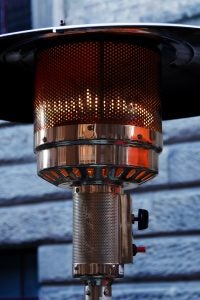 Hospitality is a major part of the UK’s economy, which has taken a significant hit since the start of the pandemic. In London alone, there are nearly 14,000 businesses that are either a pub, a restaurant or a café – providing employment and services to millions.
Hospitality is a major part of the UK’s economy, which has taken a significant hit since the start of the pandemic. In London alone, there are nearly 14,000 businesses that are either a pub, a restaurant or a café – providing employment and services to millions.
In order for these businesses to safely re-open, providing outdoor seating – and heating – will be crucial. As pubs, cafes and restaurants look for heating options, it is important to choose electric heaters over gas to avoid exposing their staff and the public to air pollutants that are dangerous to health.
Polluting gas heaters
New research by Future Climate for Environmental Defense Fund Europe found that the local nitrogen oxides (NOx) pollution produced by a single standard outdoor gas heater at 5 hours per day for a year is approximately the same as that produced by a typical gas-heated home for a year. After road transport, heating and powering homes and businesses with gas is the second largest source of NOx pollution in London.
Yet a gas-heated home disperses this pollution outside, away from inhabitants, while the outdoor gas heater is emitting that pollution directly into the surrounding space and likely the air that customers and workers breathe. So if a beer garden has 10 gas heaters working for a single night – that’s equivalent to the pollution from gas heating 10 homes, all packed into the space where several people are sitting.
Benefits of electric heaters
Fortunately, there is an alternative that does not produce any local NOx air pollution emissions, uses less energy and produces 60% less carbon dioxide: electric heaters. In addition to the environmental and health advantages, electric heaters have many other benefits:
- Cheaper to operate.
- Can be put on a timer making them more efficient.
- Can be mounted on different surfaces to be nearer to where they are needed.
Electric heaters also are better suited for the outdoors because they are designed to transmit heat to surfaces without heating up the air. As a result, electric heaters are less impacted than gas heaters by cold air and wind, which can reduce and blow away the warmth produced by gas heaters.
Local authorities should adopt pavement licensing schemes that do not permit gas heaters, like Newcastle City Council has in place. Or, authorities should prioritise giving licenses to venues that use electric heaters with controls. Similarly, any public funding to help businesses adopt social distancing measures with outdoor seating should be on the condition that measures are put in place to limit air pollutant and greenhouse gas emissions.
Other ways to reduce pollution
There are other ways that businesses can contribute to a green and healthier recovery. By making changes to the way pubs, cafes and restaurants cook food, they can reduce pollution and protect people’s health.
Future Climate’s research using the latest London Atmospheric Emissions Inventory tells us that half of the fine particulate matter (PM2.5) pollution produced in central London comes from commercial cooking – mainly grilling and frying, or anything where fat is heated or smoke is made. According to Defra, there is no lower threshold for PM2.5. Any amount can be harmful to people’s health.
Businesses can reduce the pollution they produce by using oils with higher smoke points, reducing the surface area of oil exposed to the air when frying and cooking on electric rather than gas burners, which produce NOx like the outdoor gas heaters. Cooking of any kind using wood or charcoal results in PM2.5 pollution and should be avoided wherever possible.
As many pubs and restaurants are gearing up to reopen, now is the time to consider the simple switch – from gas to electric heaters – that will warm patios and people without creating local air pollution.
